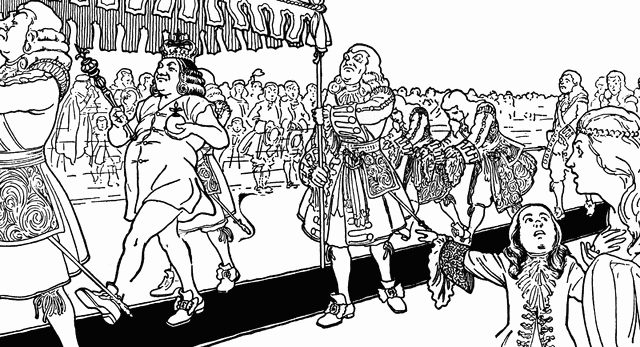That is not altogether true Alex, the sound bite on the wall validates your understanding to the Third Tradition, but if you read the whole tradition in its conclusion it states any alcoholic is member is a member if he says so. “you are a member if you say so” in a sense not even requiring a desire to stop drinking or do anything other than saying so.
Bill came up with singleness of porpoise, (I believe under political pressure from the pristine drunks seeking a morally superior validation of indignation)
In my opinion it doesn’t hold any water. And also contradicts the spirit of the Third Tradition.
The emperor has no clothes, he didn’t then and he doesn’t now. Except now we know more and it has become even more apparent for the lack of apparel.
The Kids that are coming in now are coming in younger and younger because of the powders as well as alcohol and that alcohol at one time was an illegal substance (the Volstead act) Bill did LSD and Dr. Bob was addicted to pain killers.
How many alcoholics never did any other drug? You would be hard pressed to make such a find. We are stronger when we put up a united front against the disease instead of squabbling as to its particular flavor of the disorder; remember it is an equal opportunity destroyer
A member gives us a vivid glimpse of those days. “At one time,” he says, “every A.A. group had many membership rules. Everybody was scared witless that something or somebody would capsize the boat and dump us all back into the drink. Our Foundation office* asked each group to send in its list of ‘protective’ regulations. The total list was a mile long. If all those rules had been in effect everywhere, nobody could have possibly joined A.A. at all, so great was the sum of our anxiety and fear.
We had considered calling the group Paranoids anonymous, the only problem was that nobody would tell you where the meetings were being held
“We were resolved to admit nobody to A.A. but that hypothetical class of people we termed ‘pure alcoholics.’ Except for their guzzling, and the unfortunate results thereof,
they could have no other complications. So beggars, tramps, asylum inmates, prisoners, queers, plain crackpots, and fallen women were definitely out. Yes sir, we’d cater only to pure and respectable alcoholics! Any others would surely destroy us. Besides, if we took in those odd ones, what would decent people say about us? We built a fine mesh fence right around A.A.
Only the elite (as any alcoholic women was considered fallen and beyond redemption), the real alcoholics would be permitted, otherwise just any rabble could taint our good name and to what havoc employ. If the flood gates were open to the flotsam and Jetsam of society’s cast away we would be saddled by a jaundiced judgment of assignation by association. (the town drunks were now in fear of their reputations,what would people think?)
“Maybe this sounds comical now. Maybe you think we old-timers were pretty intolerant. But I can tell you there was nothing funny about the situation then. We were grim
because we felt our lives and homes were threatened, and that was no laughing matter. Intolerant, you say? Well, we were frightened. Naturally, we began to act like most everybody does when afraid. After all, isn’t fear the true basis of intolerance? Yes, we were intolerant.”
Anger is fear in action as intolerance is acceptance in a comma.
As no roads are so rough as those that have just been mended, so no sinners are so intolerant as those that have just turned saints.
Charles Caleb Colton
How could we then guess that all those fears were to prove groundless? How could we know that thousands of these sometimes frightening people were to make astonishing recoveries and become our greatest workers and intimate friends? Was it credible that A.A. was to have a divorce rate far lower than average? Could we then foresee that troublesome people were to become our principal teachers of patience and tolerance? Could any then imagine a society which would include every conceivable kind of character, and cut across every barrier of race, creed, politics, and language with ease?
Fear can be headier than whiskey, once man has acquired a taste for it. Donald Dowries
We are more often frightened than hurt; and we suffer more from imagination than from reality.
Marcus Annaeus Seneca
The doors flung open and we were both pleased and amazed we would become a society like had never been seen before, all accepting all tolerating you were invited to learn to grows and the only requirement was a desire to stop drinking or if you think you have a problem with alcohol. Come join us in the fellowship of the spirit. It was the original glass house where no one could afford to cast the first stone
Why did A.A. finally drop all its membership regulations? Why did we leave it to each newcomer to decide himself whether he was an alcoholic and whether he shouldjoin us? Why did we dare to say, contrary to the experience of society and government everywhere, that we would neither punish nor deprive any A.A. of membership that we must never compel anyone to pay anything, believe anything, or conform to anything?
We are an unruly lot, and lots of rules would have no effect and drive some insane as we would live in search for the exception anyway We forgo the plague of rigid convention and all in all We have found that we can only pose an informed well-meaning suggestion, while an individual’s choice remains the cornerstone of prevention
The answer, now seen in Tradition Three, was simplicity itself. At last experience taught us that to take away any alcoholic’s full chance was sometimes to pronounce his death sentence, and often to condemn him to endless misery. Who dared to be judge, jury, and executioner of his own sick brother?
Hey, who made you Judge Judy and executioner? -Homer Simpson
“I’ll be judge, I’ll be jury,” Said cunning old Fury; “I’ll try the whole cause, and condemn you to death.” The mousses tail Lewis Carroll
As group after group saw these possibilities, they finally abandoned all membership regulations. One dramatic experience after another clinched this determination until it became our universal tradition. Here are two examples:
It was the time before dimes, Anno domini 1937, A.A. 02
On the A.A. calendar it was Year Two. In that time nothing could be seen but two struggling, nameless groups of alcoholics trying to hold their faces up to the light. A newcomer appeared at one of these groups, knocked on the door and asked to be let in. He talked frankly with that group’s oldest member. He soon proved that his was a desperate case, and that above all he wanted to get well. “But,” he asked, “will you let me join your group? Since I am the victim of another addiction even worse stigmatized than alcoholism, you may not want me among you. Or will you?”
I was approached by someone with 8yrs of continuous sobriety as well as a regular sponsor, he inquired of me if I would be his sponsor? I had assumed that he wanted a change of paint and a fresh look at the Steps from another perspective. I questioned him as to his motives, goals and intent. After wrestling, wrangling, and relying on the coax used by a dentist to extract a decaying tooth by the root, he was embarrassed to a blush to openly admit a pornographic addiction He was willing to admit drug and alcohol abuse in open forum, but to whisper pornography in private with a perspective sponsor his shame of ridicule was more than he could bare. Once the particular spiritual malady is addressed I have found the Twelve Steps to be a spiritual panacea for most, If not all that ails you.
There was the dilemma. What should the group do? The oldest member summoned two others, and in confidence laid the explosive facts in their laps. Said he, “Well, what about it? If we turn this man away, he’ll soon die. If we allow him in, only God knows what trouble he’ll brew. What shall the answer be— yes or no?”
“Give us you’re beaten down, your broken and your addicts longing to be free, clean and sober, Ok we will settle for a reasonable facsimile
At first the elders could look only at the objections. “We deal,” they said, “with alcoholics only. Shouldn’t we sacrifice this one for the sake of the many?” So went the discussion while the newcomer’s fate hung in the balance. Then one of the three spoke in a very different voice. “What we are really afraid of,” he said, “is our reputation. We are much more afraid of what people might say than the trouble this strange alcoholic might bring. As we’ve been talking, five short words have been running through my mind. Something keeps repeating to me, ‘What would the Master do?’” (Referring to Jesus) Not another word was said. What more indeed could be said?
A reputation once broken may possibly be repaired, but the world will always keep their eyes on the spot where the crack once stood even though no wider than a hair
Overjoyed, the newcomer plunged into Twelfth Step work. Tirelessly he laid A.A.’s message before scores of people. Since this was a very early group, those scores have since multiplied themselves into thousands. Never did he trouble anyone with his other difficulty. A.A. had taken its first step in the formation of Tradition Three.
Make your life a mission not an intermission




Latest Comments